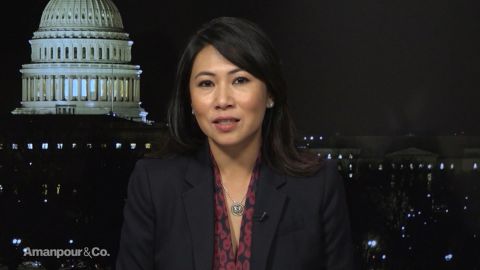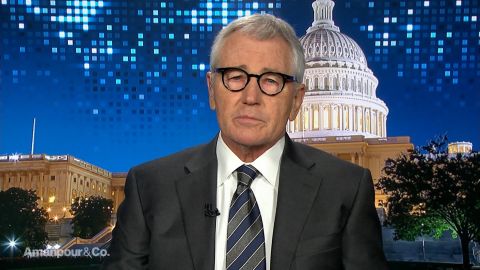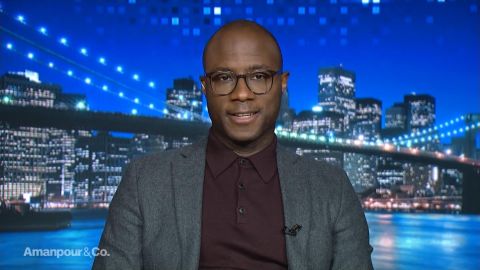Read Transcript EXPAND
CHRISTIANE AMANPOUR: Out next guest perfectly illustrates the American dream. Stephanie Murphy was brought to the United States as a baby when her family fled Communist-controlled Vietnam. In 2016, she became the first Vietnamese-American Congresswoman paving the way for diversity for the new generation of the Democratic Party. As she enters her second term, she told our Michel Martin that the U.S. Mexico border should only be one factor in the conversation about immigration.
MICHEL MARTIN: Congresswoman, thank you so much for joining us.
REP. STEPHANIE MURPHY (D), FLORIDA: Thank you so much for having me on, Michel.
MARTIN: I’d like to talk a little bit about your personal story if it’s OK. I understand that you came to the U.S. when you were just 6-months old with your parents that you had to be rescued at sea. And I just wondered, obviously, you were a baby and you were too little to remember it, but I do wonder what if anything your parents told you about that journey.
MURPHY: Well, in the aftermath of the end of the Vietnam War, my parents were persecuted by the Vietnamese government because they had been affiliated with the U.S. military, as well as with the South Vietnamese government. And they just didn’t think that they could raise a baby and an 8-year-old boy in this country where they wanted for us freedoms and opportunities and they feared for their lives. So they got on a boat in the dead of night and escaped Vietnam by sea. And when we got to international waters, we ran out of fuel. And while we were dangerously adrift, a U.S. Navy ship responded to our S.O.S. call and refueled and resupplied us enabling us to make it to a Malaysian refugee camp. And from there, a Lutheran church in Virginia sponsored my family’s passage to the United States where eventually we became proud American citizens.
MARTIN: What effect, if anything, you think that that — your origin story as an American, if you don’t mind my calling it that, what effect do you think that that had on you?
MURPHY: Certainly my experience, my family’s experience, the ability to receive both power and generosity that defines America has shaped my life. And it makes me deeply patriotic and deeply grateful to this country. It’s the reason why after 9/11, I left my private sector job and went to work at the Department of Defense. And I think it’s also the reason why in 2016 where I — when I saw this country heading in a direction that I didn’t recognize, rhetoric that didn’t comport with the America I knew, I left my private sector job again and decided to run for public office.
MARTIN: What was your eureka moment in 2016 when you said not just, you know what, somebody needs to do something about this but it’s got to be me, I’m the one who’s got to do something about this. What was that like? What was that moment for you?
MURPHY: That moment — you know, 2016, there were so much hateful rhetoric in this country and government didn’t seem to be serving the people anymore. And I was uncomfortable with it and — but it was really the — on June 12 of 2016, when a gunman walked into a nightclub in my community and took the lives of 49 innocent civilians that I decided something had to be done. And when I found that the representative from my community had taken a check from the NRA just two days after the nightclub shooting, I decided to launch a long-shot campaign against this 24-year Republican incumbent. I – – a lot of people told me that I was crazy but I think there’s a fine line between brave and crazy.
MARTIN: You know it’s funny because a lot of people say that your campaign in 2016 was something of the template for a number of the women who ran in 2018. So what do you think were the factors that led to your victory?
MURPHY: I think that it was a template because it opened the party’s eyes to the idea that you could get somebody who had never run for public office before but who had made commitments in their life to serving their communities and had rich life experience to bring to the job and came at it with an authentic voice. And I was really grateful to see how many women they recruited for the 2018 and how many of them have become victorious and will be joining — and have joined me here in Congress.
MARTIN: And now you are the head of something called the Blue Dog Coalition. You’re one of the co-chairs but you are the leader of this. Could you just describe what this is for people who don’t know? Because I think a lot of people think of the blue dogs as being southern way conservative men who are trying to preserve a certain place in the Democratic Party. So what does the Blue Dog stand for now?
MURPHY: Blue Dogs have changed over the years and this certainly isn’t your 1990s Blue Dogs anymore and it’s not your 2006 Blue Dogs either. We — even though our caucus has changed over the years, we are still unified behind two principles. And the first one is fiscal responsibility. And the second one is a strong national security. And I think at this moment in time where we see $20 trillion debt and fiscal irresponsibility by the Republicans, there’s a real place for Democratic voices to make sure that we are keeping our fiscal house in order so that we’re not mortgaging the future of our kids and that we aren’t undermining our national security or our promise to our seniors. And then on the national security front, coming out of the executive office, we see a lot of haphazard and often hasty national security policy, as well as trade policy and foreign policy. And it’s a moment for Congress I believe to exercise its Article One authorities as a co-equal branch of government and begin to check some of these behaviors to ensure that we are safe here at home and that we are strong abroad.
MARTIN: So fiscal responsibility, a strong national defense. Let’s drill down. What does that actually mean in the current environment?
MURPHY: Right now, the interest payment to the debt is three — the third largest payment. That undermines our ability to invest in our national security. It undermines our ability to fulfill our promises to our seniors. It undermines our ability to invest in our infrastructure and all of these things that are so important in this country. And so we need to make sure that we’re taking care of that, lest it really creates a future that’s unstable for this country. And a strong national security is a smart and strong national security where we partner with our allies and we make sure that we’re not emboldening our adversaries. Unfortunately, a lot of the actions that you’re seeing out of the White House these days are alienating our allies and emboldening our adversaries.
MARTIN: So let’s focus a little bit on domestic policy in part because many of the people in the freshmen class who have joined your ranks are people — a lot of people who’ve gotten a lot of attention are people who are validly — well, they’ll say that they’re socialist, that they believe in what they say are very different things. They believe in different taxation policies. They believe in investments, in things like services, health care, infrastructure. How are you going to work with this group?
MURPHY: Let me first say that I think one of the strongest points about the Democratic caucus is that we’re a broad tent caucus. We have lots of diverse ideas and passionate individuals and that makes for a better caucus, better debate on the issues, and for a better country. I’m focused on making sure that in this divided government where we have a Republican-held Senate and a Republican White House that we advance policies that can address the issues that are facing my constituents today. The cost of health care, the rising cost of housing, and education. All of these things that we advance legislation that addresses those issues today. We’re a nation of laws. And the only things that really matter are the ideas that actually become law.
MARTIN: OK. But one of your colleagues, one of the colleagues that’s gotten a great deal of attention, Alexandria Ocasio-Cortez, says that she believes in higher marginal tax rates on the highest income citizens, the highest income taxpayers. Now, let’s sort of just — let’s just establish this fact that there are a lot of people who are distorting what that means for their own political purposes. But as a small business person yourself, you perfectly well know what that means. It doesn’t mean taxing the highest — it doesn’t mean taxing every dollar at the highest tax rate. But it does mean taxing the highest taxpayers at a higher marginal rate. Is that something that you consider?
MURPHY: I think that it’s really important that all of these voices are heard. And certainly her voice is an important voice but it’s one of many of the Democratic caucus. And what the tax rates should be is a debate that we should have. But I know for certain that the Republican tax cut that gave tax cuts to the wealthiest among us and to the largest corporations and blew a giant hole in our debt was the wrong approach. And so I’m looking forward to working together with my colleagues, both within my caucus and as well as across the aisle to figure out what is the right level of ensuring that we have revenues that will allow us to make the outlays that are so incredibly important to the future of this country.
MARTIN: Is it true also you invented a — and hold a patent for a design of — let me get this right, softball pants. Is that right or baseball pants? Is that true that you designed them and hold a patent for them?
MURPHY: That is true. And I think it’s a reflection of one of the things that’s great about America is that it’s about innovation. So I bumped into a problem where women’s softball pants were essentially men’s baseball pants shrunken and made pink. And that really doesn’t accommodate for the body shape of a woman. And so I redesigned the pants in collaboration with my husband and we were able to secure a design patent on it. But I think that’s a reflection of a broader narrative about America where you run into a problem and then you find ways to innovate a better solution for it. And I certainly take that approach to legislate, is trying to find innovative solutions to move this country forward.
MARTIN: But one of the reasons that I brought that up is that your story is so compelling and yet there are so many people who believe that the system no longer works for them. But the path that you took, education, owning a small business, there are many many people in this country who believe that those paths are either closed to them or that they don’t work for them anymore. And I wonder what is your message to people who feel that way, especially younger people.
MURPHY: Well, I think that’s one of the most dangerous and destabilizing things to our democracy is when our constituents no longer believe in government and in government’s ability to serve their needs. Our democracy depends on engaged citizens. But when they become disenchanted, they tend to disengage. And that’s why it’s so important to engage with this next generation, to listen to the issues that uniquely affect them, and then to find ways to create pathways so that the American dream is still achievable. And that’s definitely my focus.
MARTIN: To that end, you also belong to something called the Future Forum. What do you hope to do with this group which is added to its membership in the current Congress as well?
MURPHY: I’m really proud to be one of the co-chairs for Future Forum which is a group of 50 of the youngest members of Congress. So what we’ve done is we’ve gone out across this country under the leadership of Eric Swalwell over the last four years and visited 50 different locations. We’ll continue to do these things. We meet young people where they are, in coffee shops, on college campuses, in their communities, and we listen to them. And then we bring their messages back to Congress and amplify their voices and then seek to find ways to address their issues through legislation. And one of the initiatives this Congress that Future Forum has engaged on that I’m really particularly proud of is the automatic voter registration. We were able to get it into the HR1. What’s so important about automatic voter registration is that it makes it easy for American citizens to be registered to vote and to participate in their democracy. And that’s incredibly important that a generation that’s used to instantaneous and needs met on their smartphones also expect an easier route to being able to vote and participate in our democracy.
MARTIN: Now, you’ve been in Congress already as I said one term and this is your second term. I do have to ask you if you feel in any way a divide between you and a number of your younger colleagues and some of your colleagues who have been there a while? Specifically, in the Democratic caucus. Do you feel a divide? Do you feel is there a generation gap in the Democratic Party?
MURPHY: I think the combination of more mature voices with the younger generation voices is a good thing for our caucus and for our government. And I also think that there are some things that are core competencies of this next generation. They have the benefit of having grown up as digital natives. And so are — can bring that tech fluency to a conversation into the scaffolding of what our tech infrastructure should look like in this country. And I think that’s an additive thing.
MARTIN: Well, OK. But are they listening to you is the question?
MURPHY: I think in Congress, there are 435 — at least in the U.S. House, there are 435 distinct voices. And I think when you work hard and you’re willing to find folks across the aisle and within your caucus to advance issues, it’s impossible to be ignored.
MARTIN: And finally before — while I have you, I do want to ask you about the government shutdown. What are your constituents telling you about this?
MURPHY: My constituents are suffering the unnecessary political drama that the president and the Republicans have put up over a political symbol of national security that lacks the real conversation around how we secure our borders. And so I have constituents who are worried about their next paycheck. And it’s the outmost irresponsible thing for them to be held hostage to this political brinksmanship.
MARTIN: I am curious though if you think that if you are at all concerned that you may be right on the substance but wrong on the politics. I mean the fact is that the president’s argument is simple which is border wall, good border wall equals national security. And I wonder whether you think that the president may be wrong on the facts but he has a compelling argument for the public. And at the end of the day that they’ll blame the Democrats for keeping the government closed or not giving the president what he wants.
MURPHY: As a former national security specialist and somebody who lives in Orlando which is one of the busiest airports in the country, as well as in the state of Florida which has thousands of miles of coastline, I understand that border security is more than just the southwest border wall. And so what I would like to do is for us to reopen the government, have an honest conversation about how we address border security, recognizing that it is only one factor in an overall conversation that must be had in this country regarding comprehensive immigration reform. We need to address this issue not just through the southwest border wall but through reform of our visa systems and through finding pathways for status, for undocumented individuals who are currently living in the country, as well as ensuring border security all across this country.
MARTIN: Congresswoman Stephanie Murphy, a Democrat of Florida. Congresswoman, thank you so much for talking to us. I certainly do hope we’ll talk again.
MURPHY: I look forward to it. Thank you so much.
About This Episode EXPAND
Christiane Amanpour speaks with former U.S. Secretary of Defense Chuck Hagel about what’s at stake for the country; and film director Barry Jenkins about his new film “If Beale Street Could Talk.” Michel Martin speaks with U.S. Rep. Stephanie Murphy about diversity and immigration.
LEARN MORE


